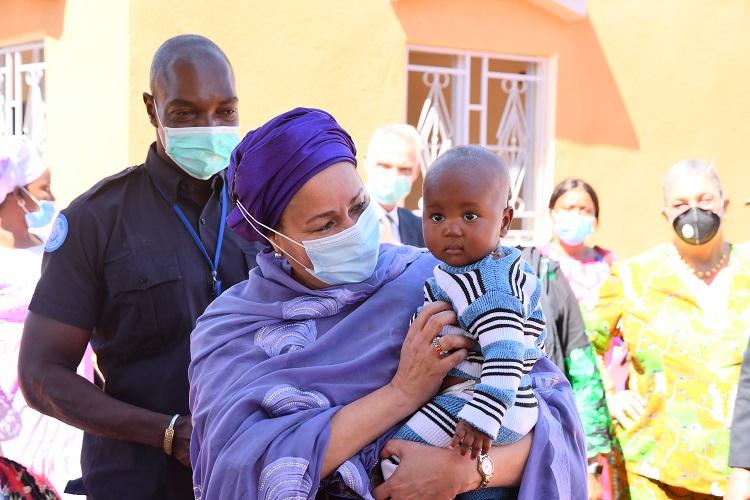Following her arrival in Mali on November 12, 2020, the Deputy Secretary-General of the United Nations, Amina J. MOHAMMED, visited Mopti in the country's center the day after. A visit of solidarity to the 500 members of the Network of Committed Women, beneficiaries of two empowerment projects funded by the UN. The visit objective was to immerse in their realities and encourage them to work further for peace and social cohesion.
"We are all sisters, from Africa, who come to meet you in solidarity to encourage your involvement in the search for peace. Like you, we are women leaders, and we count on your leadership to contribute to the rebirth of yesteryear values that have always been Mali's pride. We arehere to listen to you, and as we have told the authorities, we want to ensure that young people and women participate fully in the new Malian leadership," said Amina J. MOHAMMED in her introductory remarks.
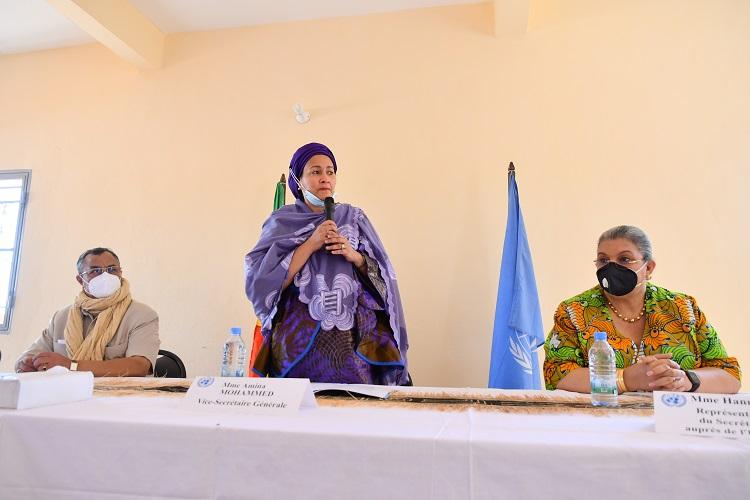
Leading a joint high-level United Nations (UN) team mission to Mali, Deputy Secretary-General MOHAMMED visited the Multifunctional Training Center of the Network of Committed Women in Sévaré, accompanied by the Special Representative of the Secretary-General (SRSG) of the UN in Mali, Mahamat Saleh ANNADIF, of the Deputy SRSG, Humanitarian and Resident Coordinator of the UN's system in Mali, Mbaranga GASARABWE, the SRSG of the UN Office to the African Union, Hannah TETTEH, the Regional Director of the United Nations Development Programme (UNDP) for Africa, Ahunna EZIAKONWA, and the Head of the MINUSMA Regional Office in Mopti, Fatou Thiam.
On the tarmac of the Ambodédjo International Airport in Mopti, these personalities were welcomed by the UN Deputy Humanitarian Coordinator in Mali, Johannes Van Der KLAAW, and the Field Coordinator of the Regional Office of the Civil Affairs Division of MINUSMA in Mopti, Jens Christensen, before heading to the "Multifunctional Training Center for Committed Women" in Sévaré.
As the delegation gathered in the Multifunctional Center's new conference room, Fatou Thiam, head of MINUSMA's regional office in Mopti, introduced the women's Network and then outlined the security challenges facing the Mopti region. She also presented this project's context to support women's capacity building to develop economic opportunities for women's resilience. "Despite all these challenges, Mopti is fortunate to have thesecommitted and resilient women who want to move forward," she said enthusiastically. Besides, the MINUSMA Regional representative described the project as having three main components: (i)Supporting women's socio-economic development; (ii) Strengthening their leadership as actors for peace and social cohesion and promoting an inclusive approach to gender equality, and finally; (iii)Vocational training and self-employment.
"This is the first-ever multifunctional training center for women in Mopti. More than a center for providing income-generating activities, it is a tool for reducing women's poverty, fighting gender-based violence, and creating jobs for young people interested in handicrafts, foodprocessing, saponification (a chemical reaction that makes soap), and dyeing. We are ready to directly ensure the operation and maintenance of the center through the sale of our products," declared the president of the Network of Committed Women.
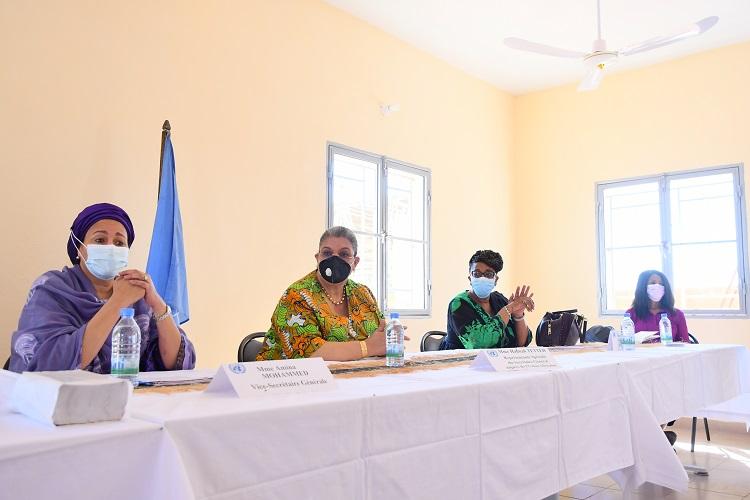
A One-UN synergy for two complementary projects
These "Committed Women" are the beneficiaries of two projects, the first of which focuses on promoting their participation in social cohesion and the culture of peace while developing their resilience capacities, and the second to support their socio-economic empowerment. With the Austrian government's support to the United Nations Trust Fund for Peace and Security, MINUSMA has injected more than 113 million CFA francs into the first project. It falls within the framework of strengthening women's capacities to promote a culture of peace and economic recovery, as per the Trust Fund objectives.
Implemented in support of the Network of Committed Women, this MINUSMA project, which brings together more than 30 women's associations from different communities, reflects the ethnic mosaic of the Mopti region and includes two essential phases. It involves securing the land made available to the Network and training them in associative life through a MINUSMA Quick Impact Project (QIP) in 2019. The second phase, which is currently underway, consists of building and equipping adequate infrastructure and setting up artisanal training structures and services, particularly for agricultural processing, saponification, and dyeing. The Civil Affairs Division is implementing this project in Mopti, whose field team, led by Mr. Jens Christensen, coordinated the visit with the UN agencies involved in the projects.
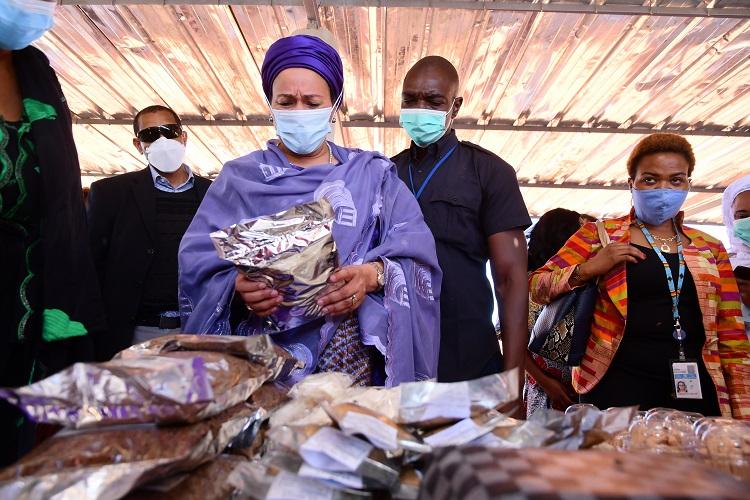
The second project, complementary to the previous one, is designed to address women's socio-economic empowerment and is being implemented by a consortium of UN agencies, including the United Nations Population Fund (UNFPA), UN-Women, and UNDP. It is part of the inclusive and equitable local development program and supports 23 women's groups in the eight circles of the Mopti region. These include groups of internally displaced persons, people with disabilities, and other violence victims during the 2012 occupation.
Among the participating "women leaders" was the disabled women's association president, who expressed gratitude for the project, which provided its members with food processing equipment and transportation to facilitate mobility. "Today, we, the disabled women, are very thankful because this is the only help we have received since we created our local organization," she said while highlighting the problematic situation of disabled people, especially women in the Mopti region.
According to the beneficiaries' testimonies, these two projects, implemented by the UN system, including MINUSMA, are achieving tangible results. They both have improved women's livelihoods through vocational training and equipped them to play an active role in promoting peace and building their communities' resilience. This synergy of actions by the United Nations, working as one entity, highlights the link between humanitarian and development work for social cohesion.
Youth and women's voices matter
Amina J. MOHAMMED, Deputy Secretary-General of the United Nations, and the SRSG in Mali, Mahamat Saleh ANNADIF, unanimously stressed the importance of women's engagement in society. The UN diplomats emphasized the need to strengthen their resilience, work with different communities for reconciliation, promote peace, and social cohesion. For his part, SRSG ANNADIF congratulated the women and renewed the Mission's commitment to accompany them for their full participation in return for peace and social cohesion.
"Africa and the world need to know what Malian women and youth want for their country," accentuated the UN Deputy Secretary-General, before inviting the Network's women members for their thoughts on possible solutions for Mali to regain peace. "Slander and defamation are undermining relationships within our communities. We need to come together, all communities together, to reconnect through dialogue and overcome the differences that make us believe we are different," commented one of the women. Ms. MOHAMMED echoed this by encouraging women to sensitize their daughters and sons to facilitate their involvement in repairing the social fabric between communities.
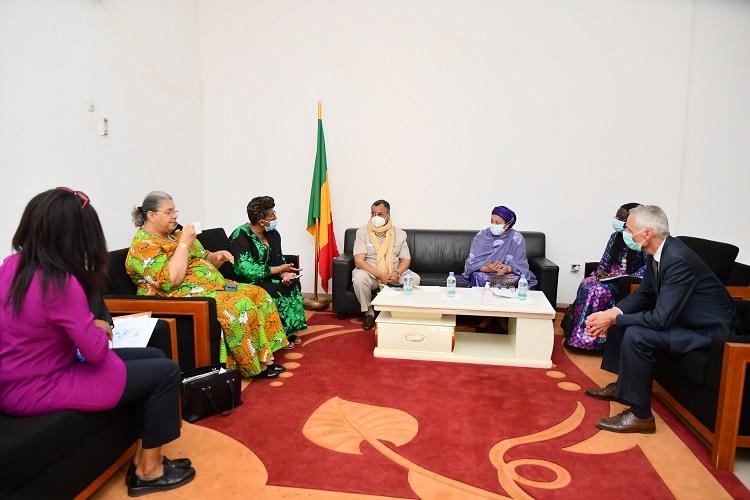
Efforts symbolizing peacemaking hope
The SRSG of the United Nations Office to the African Union, Hannah TETTEH, called on women to rally behind Mali and extend to their communities the momentum of solidarity and living together that characterizes their Network, regardless of their ethnicity. "Within the Network, you are from different ethnic groups, but all from the same country, Mali. We are with you to make the seeds of peace germinate in your villages to make Mali prosper." In the same vein, the Regional Director of the United Nations Development Programme (UNDP) for Africa, Ahunna EZIAKONWA, urged women to prioritize their children's education, especially girls, to prepare them for a better future. "Stay united at the United Nations, because we are here to accompany you," she added.
It was a short but intense visit, rich in sharing, which he felt was essential to mobilize local initiatives in the region. "The delegation came to better appreciate the UN's support to Malian society in its response to the humanitarian crisis, conflict resolution and peacebuilding, particularly in the center of the country," explained the UN Deputy Humanitarian Coordinator in Mali, Johannes Van Der KLAAW. The latter also stressed that "these women's associations support a better living together and social cohesion between different ethnic groups, to reduce conflicts. The delegation praised the efforts of women. Efforts that symbolize the hope that Mali can live again in peace".
At the end of these heart-to-heart discussions between "African sisters, these determined and committed women leaders," the delegation visited the exhibition, admiring the handicrafts and products processed by women in these projects. Of the half-dozen stands installed, the first one allowed Mrs. MOHAMMED to participate in soap making session alongside women working in this sector. While visiting the hangars that will serve as workshops for women, the Deputy Secretary-General of the United Nations briefly talked with a small group of women waiting for her there.
Before departing the "Malian Venice," Amina J. MOHAMMED warmly congratulated the women for their efforts in favor of peace and their dynamism while committing herself to the mission of raising their voices and advocating for "peace and prosperity" in Mali.
